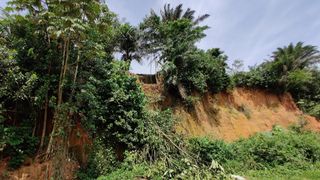Ancient humans lived in tropical rainforests much earlier than we first thought, a new study finds.
Before now, the earliest evidence of humans (Homo sapiens) living in rainforest environments dated to 70,000 years ago in Asia and Oceania, and only 18,000 years ago in Africa.
Now, according to a new study published Wednesday (Feb. 26) in the journal Nature, researchers have found evidence that humans lived in rainforest-like areas in Africa as far back as 150,000 years ago.
“Our results push back the earliest known presence of humans in tropical forests by more than twice the previously established estimate in another region of the world and also in Africa,” study lead author Eslem Ben Arous, a researcher at the Max Planck Institute of Geoanthropology in Germany, told Live Science in an email.
Modern humans evolved from our hominin ancestors in Africa some 300,000 years ago, according to the oldest known H. sapiens fossils, which were found in Jebel Irhoud, Morocco. Others discovered in Ethiopia date to about 200,000 years ago. However, these were found in areas that are thought to have been grasslands at the time of ancient human inhabitance.
Related: Modern humans arose after 2 distinct groups in Africa mated over tens of thousands of years
In the 1980s, researchers discovered stone tools, such as picks, buried deep underground at a site named Bété I in West Africa’s Ivory Coast. But at the time, they were unable to date the stone tools, according to a statement. Now, with the advent of new techniques, such as optically stimulated luminescence, which enables researchers to see when objects were last exposed to heat from the sun’s rays, researchers were able to date the tools to 150,000 years ago.
What’s more, the team uncovered traces of ancient rainforest-specific plants, offering new insights into the humid environments in which these ancient humans lived.
“Our palaecological study have shown the presence of Hunteria and Oil Palms, they are typical taxa [a group of organisms] for this ecozone and that [of] a wet tropical forest,” Ben Arous explained.

Nowadays, the southern Ivory Coast is a tropical rainforest ecosystem, but until now, it was unclear whether it was still a wet tropical forest 150,000 years ago.
These discoveries indicate that rainforest-like environments were not a barrier to human expansion, and instead were inhabited hundreds of thousands of years ago. Additionally, the presence of such old human artifacts in this region supports the theory that Homo sapiens may have arisen in multiple places around Africa, rather than all originating in a single location and spreading outward.
“We know humans did not have one single ‘birthplace’ in Africa. Yet it is currently unclear whether we are looking at humans evolving in Africa’s grasslands and savannahs, or whether a number of different environments were involved,” Ben Arous said. “Our results indicate that we are looking at the latter scenario.”
Ben Arous also suggests that ancient humans who were strongly adapted to living in rainforests did not often encounter people who were adapted to living in open grasslands.
“At 150 thousand years old, it’s the oldest known site in West Africa and shows that people have been living in this region since at least the Middle Pleistocene,” Ben Arous said. “This is important because prior to our work, the West African record was thought to be much younger.”
Human evolution quiz: What do you know about Homo sapiens?
